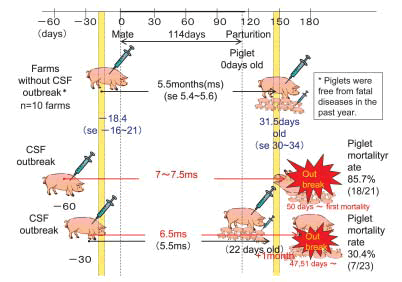Diagnosing and developing control measures for classical swine fever in Mekong Delta, Vietnam
Description
[Objectives]
In Mekong delta pig production plays an integral role of nutrient-recycling farming system among other crop productions such as rice, fish, vegetables and fruits through exchange of by-products, besides pig sales account for substantial percentage of cash income. However, farmers' operations are often hampered by disease outbreaks with high mortality of piglets. Diseases are named by symptoms and without any differential diagnosis, sick pigs are treated by antibiotics and even temporarily improved, relapsed into death or become stunted. We suspected outbreaks of classical swine fever (CSF), a highly contagious and fatal viral disease, but it also happened in vaccinated herd. Therefore, our objective of the study was to diagnose CSF through laboratory examination, investigate CSF vaccines and vaccination practices to finally provide appropriate control measures for the farmers.
[Results]
Between July 2002 and June 2003, we encountered ten fatal disease outbreaks in Cantho province. The symptoms were initially recognized in 44-day-old piglets (se 9.9, n=17 litters) and the sow was in her first parturition (median, 1 to 3). We detected CSF virus (CSFV) in piglets of seven farms with fluorescent antibody (FA) tests as well as CSFV genome in piglets of all ten farms by either analyzing amplified RT-PCR product (288 nt) of 5' NTR (Vilcek et al, 1994) with restriction fragment length polymorphism (RFLP, digestion with Bg1I) and/or from the sequence (240 nt) (Table 1). All four CSF vaccine viruses available in Mekong delta and viruses detected at farms belonged to different genogroups.
CSF vaccines were administered irrespective of the type of vaccine; no injections to the sow during pregnancy, and an injection for piglets near their weaning age and simultaneously for the sow. Thus boosters for gilts were often neglected and piglets from first parturition suffered from the disease in early stages. Higher weanlings' mortality was observed in the litter of sow vaccinated 60 days before pregnancy with a popular domestic N vaccine than that of 30 days, both failed in mating at the first heat. Ten farms that practiced N vaccines and had observed no fatal disease, so regarded as CSF free, had the sow pregnant within 3 weeks after simultaneous vaccination, and piglets at a-month old. Suggesting strict vaccination program of the sow before pregnancy is critical and sows in irregular reproductive cycle need to be individually re-boostered. CSF vaccines needs standardization and an applicable prescription shall accompany each product. Accurate diagnosis and correct recognition of the disease is indispensable to control CSF.
Figure, table
-
Table 1. Results of CSFV detection tests in piglets and the sows.
-
Fig. 1. CSF outbreaks and the vaccine practice (N vaccine, HCMC, Vietnam).
- Affiliation
-
Japan International Research Center for Agricultural Sciences Animal Production and Grassland Division
- Classification
-
Technical B
- Term of research
-
FY2003 (FY2002-2003)
- Responsible researcher
-
KAMAKAWA Akemi ( Animal Production and Grassland Division )
YAMADA Syunji ( National Institute of Animal Health )
KUBO Masanori ( National Institute of Animal Health )
YOSHII Masaaki ( National Institute of Animal Health )
TANIGUCHI Toshiaki ( National Institute of Animal Health )
HO Thi Viet Thu ( Can Tho University )
- ほか
- Publication, etc.
-
Kamakawa, A. et al. (2003): Classical swine fever among pig herds and its control in Cantho province, Mekong delta. Proceedings of the 2003 annual workshop of JIRCAS Mekong delta project, JIRCAS-CTU-CLRRISOFRI, Cantho, Vietnam 2003.
Kamakawa, A. et al. (2003): Characterization of the losses in pig production as a part of farming system in the Mekong Delta region, Vietnam. Journal of veterinary epidemiology, 7(2), 85-92 (in Japanese).
Kamakawa, A. et al. (2002): Pig management in Tan Phu Thanh village and characterization of the losses. Proceedings of the 2002 annual workshop of JIRCAS Mekong delta project, JIRCAS-CTU-CLRRI-SOFRI, Cantho, Vietnam 2002.
- Japanese PDF
-
2003_20_A3_ja.pdf2.46 MB
- English PDF
-
2003_20_A4_en.pdf62.9 KB


